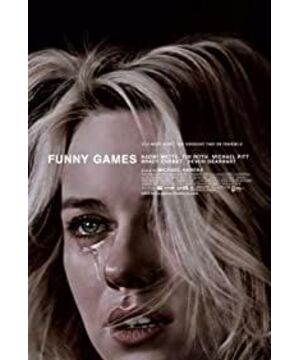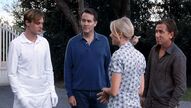First, what is the game in the title? It is a control game played between the director and the audience. How the audience is controlled by the film, such as the plot remote control that appears in the climax of the film, the villain can reverse the story that meets the audience's needs by playing backwards and enter the plot category he designed. In fact, almost every feature film is designed this way, where the director and other creators design a story for the audience to experience a certain feeling.
From the perspective of holographic law, the characteristics of the whole, the part should also have. This film is a designed game, and there are many other games in the plot. For example, the wife Ann searches for the dead dog under the guidance and control of the bad guy, which is also a part of the game. The audience has always been under the control of the creator, whether it is mood, behavior, development direction, including the finale.
The villain in the film seems to be more familiar with the family's country house. They have complete control over the whole thing, which is as absolute authority as the creator of the film. He demands that the characters obey, just as the film demands that the audience be barred from a given situation. The process of watching a movie is very funny. People are crying or laughing in front of a white cloth. In fact, everything on the screen is an artificial arrangement. Just like admiring a painting, it is nothing more than joy or worry in front of a piece of paper and a piece of cloth. Simplified, it becomes: director = controller (bad guy); family of three = (audience); the director leads the audience into a well-designed deception, the audience and the characters agree and unknowingly join in this funny in the game.
The husband in this family, who was injured shortly after the opening, became what Jacques Lacan said in the mirror image theory of the handicapped, lost the ability to move, and could only passively accept everything in front of him. The image of the wife not only satisfies the audience's voyeuristic desire, but also bears the symbol of the main audience of the audience. In the film, the wife tries to resist several times, but has not been successful. She was forced to expose her body, just as the director of the film consciously tried to satisfy the audience's voyeurism; and under normal circumstances, the main audience of the film is young women, and the blond beauty as the victim is more in line with the audience's psychological identity and emotional acceptance. The child is what Deleuze calls a motor incapacitate, and at the same time a sign of the undefended gullibility of the audience. The audience is full of anticipation for the family to be rescued, like the psychology of a happy ending. Originally, I liked the vacation trip of a family of three when I watched the movie, but it turned into a killing experience because it was designed by others. The audience was not killed, but experienced the ordeal with the characters empathically. Paul, the villain in the show, has already told the family that you will be killed, that is the intended goal and the end, and the audience, like the family, doesn't believe there will be such an end.
Peter said: "It's like a hole, so attractive that no one can escape. This is the director's own statement: I can manipulate the psychology of the audience, and no one is immune. Where is your hero, the one who helps you understand the plot and escape from it, as the audience and characters go through this brutal home invasion? Isn't that the case every time I watch a movie?
Next is the specific performance:
the music at the beginning suddenly changes: from classical music to grinding core music suddenly, this melody is played again when the child escapes and the bad guys are looking for him, this is the music of Paul and Peter, they - the film's creation The man's heart is wild, there are many impulsive and violent factors, but the appearance is polite and gentle. It's quite comical for a family to sit in the car and play a game of listening to songs and riddles, using classical music for the game.
Peter and Paul can do whatever they want in this villa, because they know the environment well, and the clothes on their bodies are in harmony with the surrounding environment, and it can almost be said to be integrated, because this villa is actually a movie theater. For the audience, the cinema is a place for entertainment, and for the creators, it is a venue for them to show their ideas and works. The subject-object relationship is clearly reversed.
As long as it is a game, there must be rules. The rules are made by the creators - the bad guys. The game is to control and be controlled, some people know how to play the game, and some people are played by the game. The bad guy - the director sets the rules of the game, the audience - passively participates in the game.
At the beginning of the film, almost all settings are favorable for the family of three: there are cars, boats, villas, golf clubs, dogs, mobile phones, and later knives, guns... And these things almost changed quickly, or were easily cut off, Or become a tool to mutilate them. Aren't the props and plot settings in each film beneficial to the creator and acting on the audience?
Modeling: Peter entered the door and the wife of the family was separated by a layer of very vague glass, just like when we watched the movie at the beginning, we didn't know anything about the plot. The blurred glass reflects the blur of the plot, and the more the audience is tortured, the more bizarre and meaningful the story becomes. They can only accept it passively, all resistance is futile, or they are self-righteous and clever.
From the perspective of the theme: the audience always hopes to have a turning point, hope to have a happy ending, good and evil will be rewarded, and heroes will save beauty. And it's all designed by someone else. The protagonist no longer has a halo, just like the audience has no privileges. The occasional halo is actually just the bad guy (director) deliberately selling a flaw.
It is also manifested in Paul's accusation that Peter should not kill children in advance, just like movies should have suspense and time constraints. The couple wanted to call for help, similar to when we wanted to be reminded when we were watching a movie, but it was in vain. Women and children are humiliated and mutilated because they are more easily emotional and more likely to be recipients of the film's emotions. All coincidences work in the bad guys' favor because they are the game controllers.
View more about Funny Games reviews











